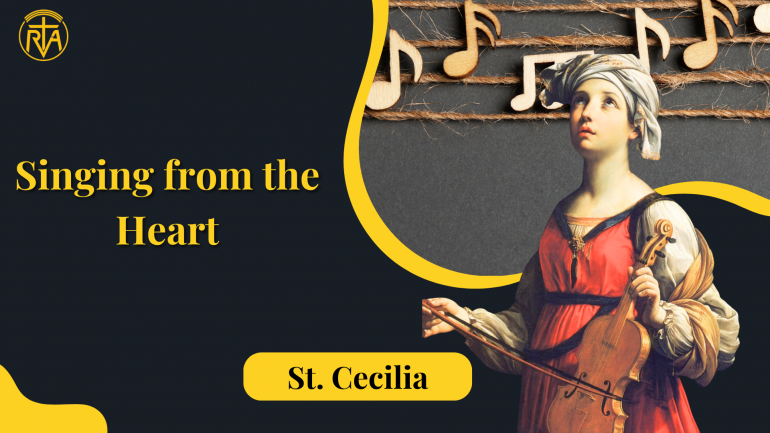St. Cecilia: Singing from the Heart

Among the many saints whose lives are hymns of praise to God, St. Cecilia holds a special place. She is remembered not only for her courage as a martyr but also for the melody of her heart that never ceased to sing to God, even amid suffering.
She is the patron saint of musicians, singers, and choirs, a reminder that every note of sacred song can become a prayer, and every heart that praises God can become an instrument of grace.
A Life That Sang for God
St. Cecilia lived in Rome in the second century, during a time when Christians faced severe persecution. Born into a noble family, she was a young woman of great beauty and even greater devotion. Though she was married to a nobleman named Valerian, Cecilia had already consecrated her heart to Christ. It is said that as musicians played during her wedding feast, she sang silently in her heart to the Lord, offering her love and life to Him alone.
According to tradition, after the wedding, Cecilia revealed to her husband that she had already given her heart to God, saying her true lover was an angel. Valerian, initially doubtful and angry, demanded to see this angel, warning that if it were human, both must die. Cecilia instructed him first to believe in God and receive baptism. Valerian obeyed, finding Bishop Urban hiding among the tombs of martyrs, and was baptized. When he returned, he saw an angel with flaming wings beside Cecilia, who placed chaplets of roses and lilies on their heads. Valerian’s brother, Tiburtius, also converted and was baptized, witnessing many wonders.
Martyrs for the Faith
Valerian and Tiburtius devoted themselves to the Christian community. When sentenced to death for refusing to sacrifice to pagan gods, their executioner was moved by the Holy Spirit, converted, and became a martyr himself. Cecilia buried the brothers and was later sentenced to death. After surviving an initial attempt at suffocation, she was struck three times by a soldier but lingered for three days, during which she gave her possessions to the poor and her house to the bishop for Christian worship.
Patron Saint of Music
Many legends explain how St. Cecilia became the patron saint of musicians. One says that on her wedding night, her husband heard her prayers accompanied by the singing of angels. Another holds that she listened to the voice of her angel. Her story reminds us that true music is felt in the heart that loves God, a harmony of faith, purity, and courage that continues to inspire all who live their lives as a song of praise.

The Sacred Gift of Music
Throughout the Old Testament, music is at the heart of Israel’s prayer. The Scriptures resound with its echoes. The Book of Job asks, “Where were you when the morning stars sang together and all the sons of God shouted for joy?” (38:7). King David danced before the Ark of the Covenant and composed psalms that form the core of our liturgy today: “I will sing to the Lord all my life; I will sing praise to my God as long as I live” (Psalm 104:33).
In the New Testament, the early Church continued this tradition. Mary’s Magnificat is a hymn of joy, and St. Paul exhorts the faithful: “Sing and make music from your heart to the Lord, always giving thanks to God the Father for everything” (Ephesians 5:19–20).
Music in the Liturgy – The Voice of the Church
In the life of the Church, music has never been mere decoration; it is prayer. Music gives voice to the soul’s deepest movements: praise, sorrow, longing, and joy. As St. Augustine said, “He who sings prays twice.”
From the early chants of the catacombs to the Gregorian melodies that filled monasteries, from the hymns of St. Ambrose to the soaring choral works of later centuries, sacred music has always mirrored the beauty of heaven. Music sanctifies time, marking the seasons of the Church, the quiet expectancy of Advent, the joy of Christmas, the solemnity of Lent, and the exuberance of Easter. In every liturgy, music unites the faithful in one voice, echoing the song of the angels: “Holy, holy, holy Lord, God of hosts.”
As Pope Benedict XVI reflected, “The singing of the Church comes ultimately out of love. It is the utter depth of love that produces the singing.” Music, then, is not performance but participation, a shared expression of faith and love that opens the heart to God.
St. Cecilia’s Legacy – Singing from the Heart
St. Cecilia’s life continues to echo in every parish choir, every humble congregation, and every whispered hymn of prayer. She teaches that music is not only for the skilled but for anyone who desires to praise. A heart that listens to God becomes an instrument tuned to His grace.
The English poet John Dryden, in his hymn A Song for St. Cecilia’s Day, wrote of music’s divine origin:
“From harmony, from heavenly harmony
This universal frame began.
And music’s power obeyed.”
When we sing with faith and love, we join in that same heavenly harmony. Every note sung in worship, grand or simple, becomes a thread in the tapestry of divine praise.
Music remains the heartbeat of Christian worship. Through the intercession of St. Cecilia, all who serve in music ministry are reminded that their gift is not a task but a vocation, a sacred calling to draw souls closer to God through beauty and sound.
Let us know how you feel!
Comments
"Music, then, is not performance but participation, a shared expression of faith and love that opens the heart to God."
Whether people understand it or not - including religious - Music is indeed a pure and highest form of participation, which is a shared expression of faith and love - which opens our hearts to God.
I really loved reading this article - which of course, gives a beautiful background in the light St. Cecilia's life - but goes beyond into the depths of humanity with what we see in the Bible to the contemporary times. It's inspiring.










- Reply
Permalink